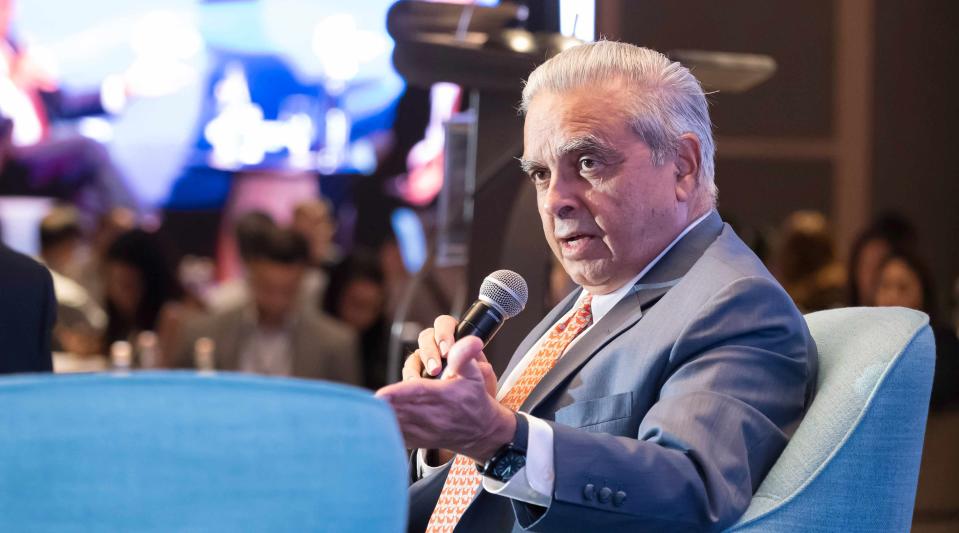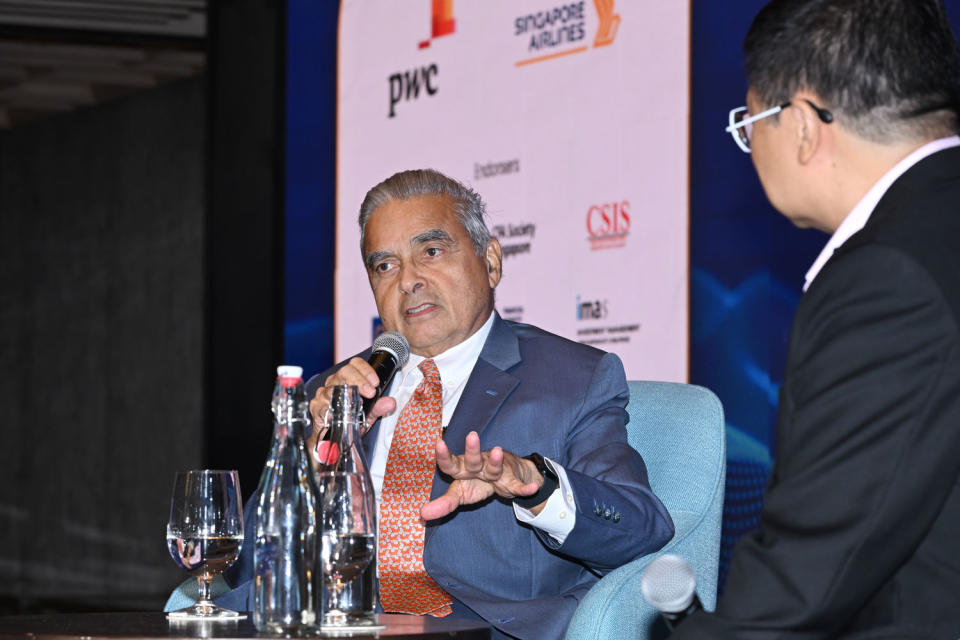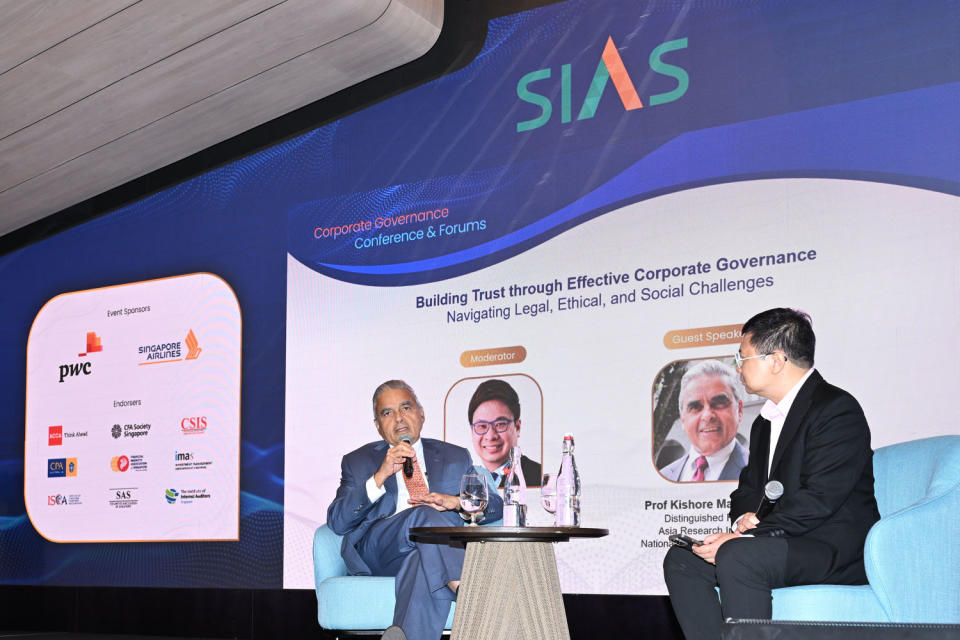Asean offers Singapore companies 'biggest protection' against US-China 'crossfire': Mahbubani

“I think it’s important on the US-China front to be ready for things to get more difficult.”
The breakdown of geopolitical trust between the US and China is the biggest challenge that Singapore companies will face over the next decade, but Asean offers the best protection against this hostile environment, says Prof Kishore Mahbubani.
There are lots of Singapore companies that do business in the US and in China, says Mahbubani, who previously served as Singapore’s Ambassador to the United Nations (UN) and President of the UN Security Council. “In the past, it was an easy path to navigate, because there were no fundamental differences. But as the differences between the US and China accentuate, and as we try to do business with both, you’re going to get caught in the crossfire.”
Speaking at the Securities Investors Association (Singapore) Corporate Governance Conference 2023 on Nov 6, Mahbubani says relations between the US and China will get worse. “I think it’s important on the US-China front to be ready for things to get more difficult.”
Under the conference theme of “Building trust through effective corporate governance: navigating legal, ethical and social challenges”, he advises Singapore companies that are entering the two markets to be aware of local regulations. “I expect that there’ll be very little building of trust between the two parties. If one party is out to bring the other party down, how do you build trust?”
Although Singapore companies will have to learn to live with “high levels of distrust” between the US and China, Mahbubani says there are “some protections” the country can develop.
“The biggest protection Singapore can develop in terms of not being caught up in this crossfire between the US and China is to build a buffer, and the best buffer is Asean,” says Mahbubani, who is currently Distinguished Fellow at the Asia Research Institute in the National University of Singapore.
Compared to Singapore’s population of five million, Asean has some 650 million people, he adds. “Asean combined can be a buffer from all kinds of pressures that are happening. Fortunately, there is a common interest among the 10 Asean countries, who don’t want to get caught in the crossfire. Most of them want to have ties with the US and they want to have good ties with China. If we all combine together, then we can fob off some of the demands that are coming our way.”

‘Deep reservoirs of trust’
Today’s trust among Asean nations is hard-won, says Mahbubani, who joined the Ministry of Foreign Affairs in 1971. “Asean has developed deep reservoirs of trust within the community, and I want to emphasise that this is a result of 52 years of work.”
Mahbubani recalls attending his first Asean meeting in 1971, when he was just a junior foreign service officer. “When you walked in the room, the amount of distrust among the Asean countries was phenomenal.”
But by the time Mahbubani became Permanent Secretary at the Ministry of Foreign Affairs in 1993, that same level of sceptism towards one another “had evaporated”. “It’s quite a stunning phenomenon to go to the same meeting [with the] same Asean countries, but 20 years of hard work had resulted in reservoirs of trust and goodwill, which, by the way, still exist today.”
Singaporeans take for granted that there will be no war in Southeast Asia, unlike in Gaza and Ukraine, he adds. “Why do you think the prospects of war are so low in this region? It’s because of these amazing decades of work on Asean. It is invisible; you can’t see it. But at the same time, if it wasn’t there, believe me, all your corporate plans would have to factor in conflicts in Southeast Asia.”
That trust may have been tested recently with Asean nations’ varying attitudes towards Myanmar’s military government. “Myanmar is obviously a problem for Asean,” says Mahbubani. “But we mustn’t get distracted by Myanmar. In every organisation, you have some problems. We have to leave Myanmar aside [and] carry on with the rest of Asean.”
Asean ‘underestimated by the world’
The rest of Asean, as Mahbubani puts it, is growing “phenomenally”. He compares the bloc’s economy to Japan, which was the second-largest in the world back in 2000.
Then, Japan’s economy was eight times the size of Asean’s. “By 2022, Japan was only 1.5 times bigger. By 2030, Asean will be bigger than Japan… That’s Asean’s growth, which has been completely underestimated by the world.”
Asean’s trade with the two superpowers tells an even greater story. Asean-US trade jumped from US$135 billion ($182.65 billion) in 2000 to US$452 billion in 2022, marking an over-threefold increase.
Asean’s trade with China, meanwhile, saw a 24-fold jump from US$39 billion to US$975 billion over the same period. “That’s the world’s largest trading relationship, larger than the United States and the EU,” says Mahbubani. “What drives this? It’s trust.”
It is also one reason why the Singapore economy is doing so well, he adds. “We have the highest trade dependency of any country anywhere in the world. Total trade is three-and-a-half times our GDP; no other country comes close. Imagine if you didn’t have this Asean ecosystem of trust facilitating this incredible growth in trade — Singapore wouldn’t be possible.”

‘Trust, but verify’
Singapore is an exceptional country and we have grown dramatically, says Mahbubani. But exceptional success, as corporates are aware, is “very hard” to replicate, he adds. “It’s especially hard if you keep on doing the same old things as you did before.”
Even successful companies may disappear if they do not reinvent themselves, says Mahbubani. “When I [was] a child, Kodak was one of the best companies in the world. Where’s Kodak today? Gone, right? Companies come, companies go if they stick to the same old formulas.”
Singapore, too, has to reinvent itself to maintain its exceptional record, he adds.
In closing, Mahbubani cites two quotes from two former leaders. “Ronald Reagan had a wonderful expression which we said when he was dealing with the Soviet Union. He said: ‘Trust, but verify.’ Also, Lee Kuan Yew used to say one of his favourite expressions [was]: ‘I always check, double check and triple check. Then, I check again.’ This was a Lee Kuan Yew rule.”
Mahbubani quips about the perils of doing otherwise: “Unfortunately, I wish I had heeded that. I will tell you a very personal story… I was recently given an investment product from a very good company. I trusted the company then, I trust it now; it’s called Manulife, an insurance company. They offered me a REIT a few years ago, [and] I invested $200,000 in it. As of today, I’ve lost 94%.”
Units in Manulife US REIT, which listed on the Singapore Exchange S68 in May 2016, have fallen from their IPO price of 83 US cents to some 7.3 US cents today.
“So, I trusted but I didn’t verify,” says Mahbubani. “Next time, trust and verify.”
Photos: Albert Chua/The Edge Singapore
See Also:
Click here to stay updated with the Latest Business & Investment News in Singapore
Dividend policies, external appraisals for directors still lacking among Singapore listcos: SIAS
From climate to US-China rivalry, Singapore weighs how to adapt
Retail investors are getting bullish on the Singapore stock market: Moomoo Singapore
Get in-depth insights from our expert contributors, and dive into financial and economic trends

 Yahoo Finance
Yahoo Finance 